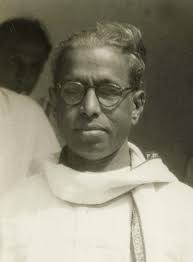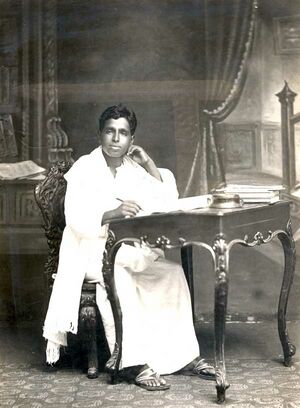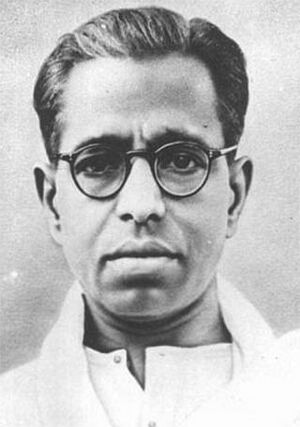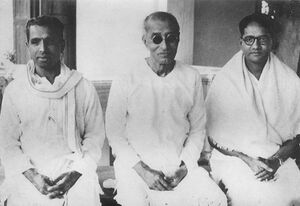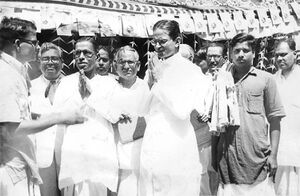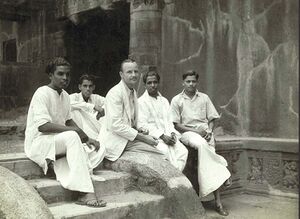Kalki (writer)
இந்தப் பக்கத்தை தமிழில் வாசிக்க: கல்கி (எழுத்தாளர்)
Kalki (Ra. Krishnamurthy) (September 9, 1899 - December 5, 1954) was an author who wrote some of the most popular historical romances in Tamil. He emerged as a writer from the Indian freedom struggle movement. He was also the pioneer of the Tamilisai Iyakkam, a movement that advocated for greater representation of Tamil songs in Carnatic concerts, and Tamil journalism. He made significant contributions in the evolution of modern Tamil prose. Historical romance novels such as Ponniyin Selvan, Sivagamiyin Sabatham written by Kalki are some of the most beloved classics of popular Tamil fiction. Kalki was the founder of Kalki magazine.
Biography
Birth, Education
Kalki was born on September 9, 1899 in Puthamangalam near Mayiladuthurai in the old Thanjavur district. His father was Ramasamy Iyer and his mother was Thayyal Nayagi. After receiving primary education in his village, he attended Mayuram Municipal High School. He then joined Trichy National High School. He did not complete his schooling as he joined the national movement at an early age and took part in the freedom struggle.
Private life
Kalki married Rukmini in 1924. He had a son (Rajendran) and a daughter (Anandi). He worked as a journalist for Thiru.V. Kalyanasundaram 's Navasakthi magazine and later for Ananda Vikatan. He successfully started a magazine under his own name – Kalki
Political career
Kalki had a long political career. When Gandhi started the Non-Cooperation Movement in 1921, he was inspired by his ideas and joined the Indian National Congress. He took part in the freedom struggle in 1922 and was sentenced to one year of imprisonment. After being released, he joined the Tamil Nadu Congress Party headquartered at Trichy. He worked in the Khadar office in Erode for some time. In 1923 he worked as a co-editor of the magazine Navasakthi run by Thiru.V. Kalyanasundaram. In Tiruchengode Rajaji inaugurated the Gandhi Ashram on February 6, 1925 and launched the magazine Vimochanam. Kalki went to Tiruchengode and stayed with Rajaji where he then lead the Vimochanam magazine. Kalki considered Rajaji his political mentor. He followed Rajaji’s political views and remained with him till his death. He was known as "Rajaji's sword". In 1930, he participated the Salt Satyagraha led by Rajaji and was arrested at Gobichettipalayam for violating the Salt Act of 1882. He was imprisoned for six months. When Gandhi declared the Quit India movement in 1940, he resigned his job as editor of Ananda Vikatan magazine and joined the struggle. He was sentenced to three months of rigorous imprisonment.
Journalism
Kalki was a relentless journalist since 1923. He worked as the co-editor of Thiru.V. Kalyanasundaram's Navasakthi magazine. In 1931 he became the co editor of the Ananda Vikatan magazine started by S.S. Vasan. Kalki made Ananda Vikatan a successful public magazine. Ananda Vikatan magazine made popular/pulp reading a campaign in Tamil culture and a successful business. Kalki developed a simple style of humor and satire suitable for the general readers. He created a lineage of writers like Devan, Thumilan etc. who followed his style of writing. He pioneered journalistic writing in many areas, including film criticism and political writing.
Kalki started the magazine Kalki in 1941 with the help of his friend Sadasivam. It is said that the reason behind this was that Ananda Vikatans S.S. Vasan condemned Kalki’s involvement in the Quit India Movement. Rajaji blessed Kalki for his venture into the creation of Kalki magazine. The serialized historical romances he wrote in Kalki magazine which started with the novel, Parthiban Kanavu, sealed its success. This was then followed by the widely popular novels Sivagamiyin Sabatham and Ponniyin Selvan.
Kalki allowed a string of writers like Mayavi and P.M. Kannan, who had a different style of writing from his own, use the Kalki magazine as a platform. Writers like Na. Parthasarathy (Manivannan) who followed in Kalki's footsteps were inspired by the writing styles of V.S. Khandekar and Mu. Varadarajan. Thus Kalki was one of the foremost pioneers of Tamil journalism and popular Tamil fiction.
Literary life
Mahatma Gandhi's autobiography was serialized in Navjivan from 1925 to 1929. Kalki simultaneously published an abridged Tamil translation of this work in Navasakthi. He also wrote short stories for Navasakthi in the same period. When the magazine Ananda Vikatan was launched, a friend of Subramania Bharathi, Parali S. Nellaiyappar, introduced Kalki to S.S. Vasan in February, 1928. Kalki wrote a humorous article titled Ettikku Potti in Ananda Vikatan. This was the first article written by Krishnamurthy under the pseudonym Kalki. A subsequent collection of essays entitled Ettikku Potti was published in 1927 with an introduction by Rajagopalachari.
At the age of 23, Kalki wrote the novel Vimala while in prison for being involved in the Non-Cooperation Movement. It was autobiographical in nature, about a young man imprisoned for his involvement in the Non-Cooperation Movement. This novel was serialized in V. Ramasamy Iyangar's (Va. Ra) magazine Suthanthiram in 1923. Kalki wrote it under the name Ra. Krishnamurthy.
In 1937 he published his first series Kalvanin Kadhali in Ananda Vikatan under his pen name Kalki. Following Kalvanin Kadhali, he published Thyaga Bhoomi in Ananda Vikatan, which was made into a motion picture. After he started his magazine Kalki, he began writing grand historical romances starting with Parthiban Kanavu. His most famous novels among them were Sivagamiyin Sapatham and Ponniyin Selvan. Ponniyin Selvan (1952) was considered to be the foremost popular literary work in Tamil.
Tamil Music Movement
Kalki was one of the pioneers of the Tamilisai Iyakkam (Tamil music movement), which was started with the demand that Carnatic music concerts should give a prominent place to Tamil compositions. He wrote numerous articles in support of the Tamil music movement. Kalki wrote the lyrics to the film composition "kaatrinile varum geetham", which was a noteworthy Tamilisai song. In 1941 he attended the first Tamil Music Conference organized by Raja Annamalai Chettiar in Chennai. His articles in support of the Tamil Music Movement have been compiled into a book titled Sangeethayogam.
Cultural Activities
- Kalki attended the Tamil Music Conference held at Ettayapuram in 1945 . During the ceremony, a request was made of him to build a memorial hall for Subramaniya Bharathi at Ettayapuram. Kalki put forth the same request to the reading public through his magazine. The hall was inaugurated by C. Rajagopalachari on October 13, 1947.
- Kalki raised funds for Bharathi's wife Chellamma Bharathi in 1945 and created a deposit fund.
- In 1948, writer Pudhumaipithan, who was a fierce critic of Kalki, passed away. Kalki then raised funds to help Pudhumaipithan's wife Kamala and her daughter out of poverty. A significant amount was donated to her.
Literary Significance
Kalki's primary literary contribution was his contribution to the development of Tamil prose. He expanded all the possibilities of Tamil prose by writing a series of entertaining novels, magazine articles, short stories, travelogues, music criticism, film criticism, political criticism, satire and biographies. In this regard, he was a pioneer. Three generations of writers have followed him since.
Early novels of Kalki such as Thyaga Bhoomi are similar to those of George W.M. Reynolds, thrilling and sentimental. Kalki's storytelling was influenced by pioneers such as Vaduvoor Duraisamy Iyengar. He later wrote historical novels. Kalki cites writers such as Sir Walter Scott and Alexander Dumas as his inspirations. Critics considered novels such as Parthiban Kanavu, Sivagamiyin Sabatham, and Ponniyin Selvan to be historical romances.
But unlike his predecessors, Kalki's works, although wildly popular, contained elements of the Indian national uprising, Tamil cultural renaissance and social reforms of his period. His historical novels depicted the historical golden age of the Tamils. His novels were based on the researches of historians like K.A. Neelakanda Sastri and they took the history of the Cholas and Pallavas to the lay public. They reinforced the Tamil national pride that was already emerging during his period. Kalki's novels depict the cultural evolution of Tamil Nadu. Sivagamiyin Sabatham echoes the tone and sentiments of Ramayana while Ponniyin Selvan has the tone of Mahabharata. Ponniyin Selvan was influenced by novels such as Alexander Dumas' 'The Three Musketeers’ and 'The Man in the Iron Mask’. In his book 'Naveena Thamizhilakiya Arimugam’ (Introduction to modern Tamil literature), writer Jayamohan notes that Kalki "combined the spirit of the Indian epic tradition with the descriptive narration of Western adventure novels to create his fiction".
Controversies
- In 1936, Kalki made a controversial statement that Subramania Bharathi was not one of the Mahakavis (great poets) of India, an opinion that was opposed by writers like Ku.Pa. Rajagopalan. This was known as the 'Bharathi-Mahakavi controversy'. The writers wrote a series of articles back and forth on this topic in 1936, which were later compiled and published by Rajagopalan under the title Kannan En Kavi (Kannan, my poet).
- In 1937, Pudhumaipithan accused Kalki of plagiarising from the novels of Alexander Dumas and Walter Scott. Kalki denied the accusation. This was a controversy, on which many authors and critics weighed in with their opinions.
- When Gandhi announced his Temple Entry Movement in 1939, the head of the Kanchi mutt, Chandrasekara Saraswati opposed it. Kalki vehemently objected saying, "You are the leader of a caste, not a jagatguru (Teacher of the World)." This statement was controversial.
Works
Novels
- Kalvanin Kadhali (Thief’s Lover) (1937)
- Thyaga Bhoomi (Land of Sacrifice)(1938-1939)
- Magudapathi (1942)
- Abalayin Kaneer (Tears of Agony) (1947)
- Solaimalai Ilavarasi (Princess of Solaimalai) (1947)
- Alai Osai (Sound of the Waves) (1948)
- Devagiyin Kanavan (Devaki's Husband) (1950)
- Mohini Theevu (Mohini Island) (1950)
- Poiman Karadu (1951)
- Punnaivanathu Puli (Tiger of Punnaivanam) (1952)
- Amara Thara (1954)
Historical novels
- Parthiban Kanavu (Parthiban’s Dream) (1941 - 1943)
- Sivagamiyin Sabatham (Sivagami's vow) (1944 - 1946)
- Ponniyin Selvan (Son of Ponni) (1951 - 1954)
Short stories
- Subathirayin Sagothiran (Brother Of Subhadra)
- Ottrai Roja (Single Rose)
- Theepiditha kudisaikal (Huts On Fire)
- Pudhu Overseer (The New Overseer)
- Vasthudhu Venu
- Amara Vazhvu (Eternal Life)
- Sunduvin Sanyasam (The Asceticism Of Sundu)
- Thirudan Magan Thirudan (Thief, Son Of A Thief)
- Imayamalai Engal Malai (The Himalayas Are Our Mountain)
- Pongumankadal (Rising Sea)
- Master Medhuvadai
- Pushpa Pallaku (The Flower Palanquin)
- Prapala Natchathiram (Celebrity Star)
- Pithalai Ottiyanam (Brass Ottiyanam)
- Arunachalathin Aluval (Officials Of Arunachal)
- Parisal Thurai (Parisal Dock)
- Susila M. A.
- Kamalavin Kalyanam (Kamala's Wedding)
- Tharkolai (Suicide)
- S. S. Menaka
- Saradhai Yin Thandhiram (Saradha's Gambit)
- Governer Vijayam (Governor's Visit)
- Number
- Onpathu Kuli Nilam (Nine Pit Land)
- Punnaivanathu Puli (Tiger Of Punnaivanam)
- Tiruvalunthur Sivakkoluntu
- Zamindar Magan (Son Of Zamindar)
- Mayilai Kaalai (Bull Of Mayilai)
- Rangadurgam Raja
- Idindha Kottai (The Ruined Fort)
- Mayilvizhi Maan (Peacock Eyed Deer)
- Nataga kaari (Theatre Actress)
- Tappili Cup
- Kanaiyaliyin Kanavu (Signet Ring's Dream)
- Kedhari Yin Thayar (Kedhari's Mother)
- Gandhimathi Yin Kadhalan (Gandhimathi's Lover)
- Chiranjeevi Kathai (Story Of Chiranjeevi)
- Srikanthan Punarjanmam (Srikanthan’s Rebirth)
- Paladaintha Bungalow (Dilapidated Bungalow)
- Chandramathi
- Police Virundhu (Police Dinner)
- Kaidhi Yin Prarthanai (Prisoner's Prayer)
- Karirulil Oru Minnal (Lightning In The Dark)
- Thandhaiyum Maganum (Father And Son)
- Bhavani, B. A, B. L
- Kadithamum Kaneerum (Letter And Tears Shed)
- Vaira Modhiram (Diamond Ring)
- Veena Bhavani
- Thooku Thaṇdanai (Execution By Hanging)
- En Deivam (My God)
- Ejamana Vishvasam (Faithful Servant)
- Idhu Enna Sorgam (What Kind Of A Paradise Is This)
- Kailasam Iyar Kaabaraa
- Lanjam Vankadhavan (The One Who Does Not Accept Bribes)
- Cinema Kadhai (Cinema Story)
- Engal Oor Sangeedha Potti (Music Competition In Our Village)
- Rangoon Mappillai (Groom From Rangoon)
- Devakiyin Kanavan (Devaki's Husband)
- Bala Josier (Young Astrologer)
- Madadhevan Sunai (Madadhevan's Spring)
- Kaatharaa Kallan
- Malatiyin Thandhai (Malathi's Father)
- Veedu Thedum Padalam (House-hunting Chapter)
- Neenda Mugavurai (Long Preface)
- Paangar Vinayakarao
- Deyvayanai (Divine Elephant)
- Govinthanum Veerappanum (Govindan And Veerappan)
- Chinnathambiyum Thirutargalum (Chinnathambi And The Thieves)
- Vidhushagan Chinnumudhali (Chinnamudhali, The Jester)
- Arasur Panchayathu (Arasur Panchayat)
- Governor Vandi (Governor's Car)
- Thandanai Yaarukku (Who Is Punished?)
- Suyanalam (Selfishness)
- Puli Raja (Tiger King)
- Visha Mandhiram (Poisonous Spell)
Essays
- Ettikku Potti - Comedy Articles
- Sangeethayogam - Articles on Tamil Music - 1947, Tamil Pannai Publication.
Translated works
Novels like Ponniyin Selvan, Sivagamiyin Sapatham, Parthiban Kanavu, Alai Osai have been translated into English by numerous translators.
In other forms
Movie
- Kalvanin Kadhali, written by Kalki, was made into a motion picture in 1955 by V.S. Raghavan.
- Thyaga Bhoomi written by Kalki was made into a film in 1939 under the direction of K. Subramaniam.
- Meera, written by Kalki, starring M.S. Subbulakshmi, was released in 1945. Kalki wrote the story and dialogue for the film and five songs. The film was a success and he invested his earnings in the Kalki magazine.
- Parthiban Kanavu, written by Kalki, was made into a film in 1960 under the direction of Yoganath
Drama
Works like Ponniyin Selvan and Sivagamiyin Sabatham have been staged by various theatre groups.
Awards
Sahitya Akademi Award, 1956 - Alai Osai
Sangeetha Kalasikamani Award, 1953, The Indian Fine Arts Society
Death
Kalki passed away on December 5, 1954 at the age of 55. He suffered from tuberculosis for five years.
Case Record
Writer Sunda (Meenakshi Sundaram) has written a biography on Kalki under the title "Son of Ponni". It was serialized in Kalki magazine
References
https://www.kalkibiography.com/
Sangeetha Yoga https://www.jmi.ac.in/upload/departments/history/drs/Cankita%20yokam.pdf
✅Finalised Page
